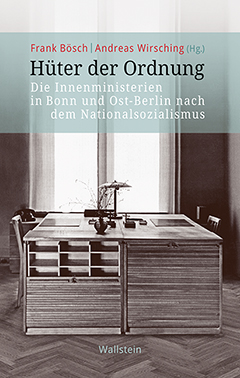Research project in cooperation with IfZ
Direction: Professor Frank Bösch (ZZF) and Professor Andreas Wirsching (IfZ)
Researcher at the ZZF: Martin Diebel, Franziska Kuschel, Stefanie Palm, Dominik Rigoll
In the former Federal Republic and the GDR, the Departments of the Interior were responsible for key areas of politics and administration. This research project systematically explores the post-war era of the Federal Ministry of the Interior (BMI) and the Ministry of the Interior of the GDR (MdI) and concentrates particularly on personnel and political continuities as well as processes of transformation in respect to the Nazi era. The project was initiated by Interior Minister Dr Thomas de Maizière in December 2014 and has been conducted by the Institute of Contemporary History Munich-Berlin and the ZZF Potsdam under the administration of the respective directors Professor Andreas Wirsching and Professor Frank Bösch. The research group consists of six postdocs and two postgraduates – alongside the project managers. A board of supervisors consisting of academics from both institutes advises and supports the project.
First results were published in a pilot study in October 2015 and presented to the public at the conference ‘NS-Belastung und politischer Neuanfang’ in November 2015. In June 2017, the research group presented further results at the conference „Getrennte Wege nach dem Nationalsozialismus? Vergleichende Perspektiven auf die Innenministerien in Bonn und Ost-Berlin“ in Berlin. The members of the research group also discussed their findings with experts and an interested public in workshops, panel discussions and conferences. Accompanying the research project was the virtual exhibition „Kontinuitäten, Brüche, Neuanfang. Umgang mit dem Nationalsozialismus in den beiden deutschen Innenministerien 1949 bis 1970“, designed by students of the Public History degree program at Freie Universität Berlin/ZZF Potsdam.
The major study goes into more detail in respect to the political actions of senior employees. The main book „Hüter der Ordnung – Die Innenministerien in Bonn und Ost-Berlin nach dem Nationalsozialismus“ was published in June 2018, several monograph will follow in 2019.
Website research project ‘Die Nachkriegsgeschichte des BMI und des MdI’

